The impact of road salt on watersheds — a topic of rising concern in communities across Ontario — was the topic of a well-attened and at times passionate panel discussion Monday evening at the Vale Living With Lakes Centre.
The message from the expert panel was clear: Road salt is compromising the projected health of Ramsey Lake and if conservation-wise management is not undertaken by the city promptly, the long-term health of the drinking water source for 50,000 Sudburians, not to mention the flora and fauna that call the lake and its environs home, will be in jeopardy.
The discussion was chaired by former Kirkland Lake mayor, long-time environmentalist and conservationist and retired physician Dr. Richard Denton. Filling out the panel was Dr. John Gunn, Canada Research Chair, Stressed Aquatic Systems and the director of the Vale Living with Lakes Centre; Dr. Charles Ramcharan, an associate professor in the School of Environment at Laurentian University; and Anoop Naik, a water resources specialist at Conservation Sudbury.
The panelists agreed the presence of road salt is increasing in several of the city's waterways, but Ramsey Lake is of particular concern.
"There's very good evidence from testing the drinking water that Ramsey Lake in particular has been steadily going up for decades," said Gunn. "There's no reason not to expect that it will continue to rise, but at what rate is another question."
Approximately 50,000 Sudburians rely on Ramsey Lake for their drinking water. Lake Wanapitei is another source of the city's water, but that lake contains considerably less salt than what has been found in Ramsey, panelists said.
While probably easier said than done, the only option for addressing Ramsey's high levels of salt is to stop adding it to the lake, panelists said. Road salt is the primary cause of deposits in the waterway and it can be difficult to remove, they said. Plus, Naik added, it doesn't appear municipal water treatment is doing the job.
"When I superimposed both the treated water from David's Creek Treatment Centre and the raw water (from Ramsey Lake), there's hardly any difference," he said. "On the contrary, the treated water actually adds a few milligrams per litre of sodium."
High salt content poses dangers to aquatic life in the lake, dangers to people with hypertension who get their drinking water from the lake and lowered property values on account of increased algal blooms. At 55 milligrams per litre, the salt content of the lake is at the point people should be concerned, Ramcharan said.
"We are in the yellow. We're already at a sodium level where there are human health concerns," Ramcharan said. "Doctors at the health unit will be telling their patients that they have to be careful drinking Ramsey Lake water if they are on a low-sodium diet. We are already at that level."
"Salt concentration is increasing in our drinking water," Denton said. "It needs to be addressed and now is the time to do it."
Alternatives to using salt on icy roads exist, the panelists said, mentioning treating roadways and sidewalks agricultural with things like beet juice, pickle juice or potato juice. Alternatively, substances that improve traction could include wood chips used in conjunction with salt. "Eco-traction" is a new technology that uses volcanic mineral that easily embeds itself into ice and snow.
"The city had an enormous vision around the 100-year Ramsey Lake Plan," Gunn said, while motioning to the darkened sight of Lake Ramsey beyond the room's half enclosure of glass. "That plan is nearly a quarter of the way through. More than 25 years has gone by and we don't quite see the vision out the window that we imagined at the time.
"The same kind of investments as we are putting into the casino and the performance art centre, it needs that same scale of thinking and investment to make (Sudbury) this really attractive technology centre around clean water where quality of life and knowledge infrastructure is surrounded by lakes and a better place to live than say, Silicon Valley or a place called Toronto."
